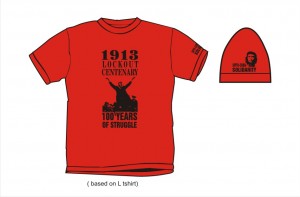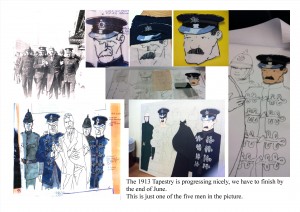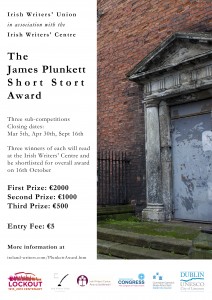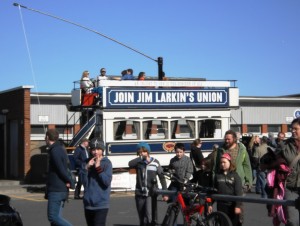Living the Lockout
Living the Lockout is a drama by award winning ANU Productions. It has been created by a partnership of Dublin City Council, the Irish Congress of Trade Unions and Irish Heritage Trust. It is well worth a visit. Go to http://

Living the Lockout is a drama by award winning ANU Productions. It has been created by a partnership of Dublin City Council, the Irish Congress of Trade Unions and Irish Heritage Trust. It is well worth a visit. Go to http://
 The Lockout T Shirt is now on sale in the in the Trinity College Students Union Shop (just inside the front gate of TCD)
The Lockout T Shirt is now on sale in the in the Trinity College Students Union Shop (just inside the front gate of TCD)
A Panel in the making – this Panel, which is being made by Volunteers from the Abbey Theatre, is based on the famous photograph of Jim Larkin being arrested at the Imperial Hotel Dublin on Bloody Sunday 1913. It will go with two complementary panels in a large ‘Bloody Sunday’ block five feet wide by four feet deep. We now have six completed Panels and the rest due in by the Tapestry Workshop on Saturday June 29th in Liberty Hall at 10.30am, 
 Almost uniquely in Irish consciousness, the 1913 Lockout is remembered and accessed almost exclusively through literature. The events and the legacy of 1913 are often difficult to interpret. In his seminal book, ‘Strumpet City’, James Plunkett takes the events of 1913 and weaves them into a format that is instantly accessible: the humble story.
Almost uniquely in Irish consciousness, the 1913 Lockout is remembered and accessed almost exclusively through literature. The events and the legacy of 1913 are often difficult to interpret. In his seminal book, ‘Strumpet City’, James Plunkett takes the events of 1913 and weaves them into a format that is instantly accessible: the humble story.
Here is the Mural that has won the Sunday World’s Best Men’s Shed competition. The ’third man’ in the picture is Seán, whose Dad Jason Walsh-McLean was one of the main artists involved.
Jason says that when the organisation first acquired premises in Loughlinstown, County Dublin, “it was very dull, so we painted it. At the time I thought a mural would brighten the place up, despite never having done one before. Initially I was thinking of a football mural. But seeing as we have Shamrock Rovers and Boh’s fans in the Shed, not to mention two Rangers fans from Scotland and a load of Irish Celtic fans, we probably would never have been able to agree on what to do.”
The idea for a 1913 Lockout theme came after the group began holding a “FILM NIGHT” in the Shed and watched Strumpet City, the RTE drama about the 1913 Lockout, based on James Plunkett Kelly’s book of the same name that is now a number one best seller again.
“With so much unemployment in the country at present and the current recession it seemed very apt”, Jason says. “A lot of our members would be former tradesmen who are out of work. It is to them that we dedicate the mural.”
The Local Men’s Shed (Louhghlinstown/Ballybrack) has been going for two years. It recently won an award in the Dún Laoghaire/ Rathdown County Council’s Community Awards scheme, run an Irish Language class and a computer class, as well as trips to places of interest. The group hopes to move to larger premises in the near future “so that we can get involved in more projects”, Jason says.
Membership is €5 a year and is open to anyone living in the catchment area.
Meanwhile anyone who wants to see the Mural in all its splendour can find it at:
LBS Men’s Shed, 125A Cedar Court, Loughlinstown, Co. Dublin
1913 and Beyond
‘Fellow delegates, In presenting their report for the year just passed your Committee have again to express their regret that labour legislation is not advanced during the period under review to any appreciable extent, and to record a succession of serious disappointments is but to place before you the absolute truth’.
Thus Tom Johnson, with characteristic modesty and truth, opened the 1914 conference of the Irish Trade Union Congress on the Whit Monday of that year in Dublin City Hall. (The ‘and Labour Party’ suffix had yet to be added to the title page). It was a theme sadly familiar to participants, made all the more galling by the continuing close relationship between John Redmond’s Irish Parliamentary Party and the British Labour Party. The most important ‘disappointment’ had been the failure to have the National Health Insurance Act extended to Ireland. Even more galling was the decision of the British Labour Party in the aftermath of the Lockout to facilitate P J Brady, the Irish Party MP for the Stephen’s Green Division of Dublin City, in presenting a Bill to extend the Feeding of the Necessitous School Children’s Act to Ireland. Not only was the measure more restrictive than the English legislation but it allowed the Redmondites to claim credit for a measure repeatedly demanded by the ITUC and Irish female suffrage groups, which the IPP had previously opposed.
When Jim Larkin was elected President of the ITUC by acclamation that morning he did no more than voice the frustration of the whole assembly when he attacked the British Labour Party for ‘taking counsel with the Irish National Party on labour matters or on questions affecting the workers in Ireland over the heads of the representatives of the Irish Trade Union Congress’; especially as ‘these were the very men … whom in Ireland they had to fight as amongst their bitterest enemies’. Larkin had first made his protest at this policy the previous July, when he was part of the ITUC Parliamentary Committee delegation that met Labour MPs in the House of Commons. (more…)
On the History of the Larkin T shirt.
The SIPTU Solidarity with Cuba Forum and the Irish Friends of Cuba Coalition have been discussing ways of commemorating the solidarity shown to the Dublin Lockout members by British trade Unions who contributes extraordinary supplies of food and clothing aid as well as finance. It was felt that for the Centenary of the Dublin Lockout it would be appropriate to have a commemorative T shirt in a vivid colour depicting one of the central characters of the Dublin event Jim Larkin along with the 100 years of Struggle – to remind people that we still have not got collective bargaining rights in 2013.
The design was a joint effort between myself, Eira Gallagher and our supplier Val Bates and his design team> They also supplied us with the polo shirts and fleeces which carry a design including Che Guevara and the SIPTU Solidarity with Cuba Logo.
We sell stock at marginally above cost price and any monies raised go into the Forum account which supports a number of Cuban health and educational projects. We hope to make a sizable donation to these projects when the Forum group visit Havana in November 2013. The Cuban Coalition are examining ways of having closer ties between trade unions and political parties who support the Cuban ideal with a view to having an ongoing project in Cuba.
In solidarity
Jack McGinley
T-Shirts are €12.50c and can be ordered from KMCGINLY@tcd.ie
 The 1913 Tram is on display at this weekend’s Prawn Festival in Howth (April 26th-28th). At least it did not have far to travel as the Museum is around the corner in the Deerpark and Howth Demesne.
The 1913 Tram is on display at this weekend’s Prawn Festival in Howth (April 26th-28th). At least it did not have far to travel as the Museum is around the corner in the Deerpark and Howth Demesne.
This extract from Pat Quigley’s new book ‘The Polish Irishman: The Life and Times of Count Casimir Makievizc (Liffey Press) gives a flavour of this beatifully written and unusual take on Bohemian Dublin in the years leading up to the Easter Rising. Colourful characters, arcane organisations and the dog taken prisoner of war in 1916 are just some of the gems, not to mention new pictures of Constance, Casimir and their coterie.

Beginning
Dublin 1913 conjures up images of policemen rioting in O’Connell Street, strikers attacking trams, hungry people on the quays and tenements falling into the streets, but for the couple who lived in 49B Leinster Road, aka Surrey House, that January started much the same as any other. (more…)

Charlie Murphy, Dublin Port, Jack O’Connor, SIPTU, Sarah Lundbery, East Wall History Group and John ‘Miley’ Walsh, retired docker at start of Dockers commemorative event, Five Lamps, Dublin
Over three hundred and fifty people attended the service organised by the Dublin Dock Workers Preservation Society in St Laurence O’Toole’s Church on Saturday 20th April 2013. Included in the gathering were Emer Costello (MEP), Maureen O’Sullivan TD and Pascal Donoghue TD, Councillor Lucy McRoberts (representing the Lord Mayor), and Councillors Nial Ring, Christy Burke and Anna Quigley. Other participants included Jack O’Connor, General President of SIPTU and Charlie Murphy, representing the Dublin Port Company.
Dublin Port Communities celebrate those who have passed on
The arrival of the Irish Transport and General Workers Union (ITGWU) as a new force of organised Labour was welcomed no-where more enthusiastically than in the Dublin Docks. In those early days it was the casual labourers, warehousemen and carters who first swelled its ranks and many of its earliest victories occurred here. The Dockland communities were witness to the birth of the new Irish trade union movement, and were participants in its greatest battle in 1913. It is most fitting that in the centenary year of the Great Lockout, that the first ever Service of Remembrance for all deceased Dublin Dockworkers should be held.